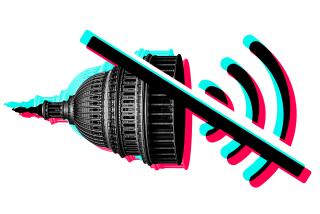Few Holdouts Resist ITunes
- Share via
DETROIT — Bob Seger turned the page, and Metallica finally found justice for online fans. Now, only a few remaining big-name musical acts refuse to make their songs available on Apple Computer Inc.’s popular iTunes Music Store.
Analysts say the online holdouts -- including the Beatles, Led Zeppelin, Garth Brooks, Radiohead and Kid Rock -- probably can’t avoid iTunes forever as fans flock to the Internet.
For the record:
12:00 a.m. Aug. 31, 2006 For The Record
Los Angeles Times Thursday August 31, 2006 Home Edition Main News Part A Page 2 National Desk 1 inches; 53 words Type of Material: Correction
iTunes holdouts: An article in Monday’s Business section about big-name musical acts that have declined to make their songs available through Apple Computer Inc.’s iTunes Music Store omitted the name of Garth Brooks in a paragraph about an artist who has not allowed his songs to be legally downloaded at any major stores.
But the artists argue that online distribution leaves them with too little profit. And, they say, iTunes wrecks the artistic integrity of an album by allowing songs to be purchased by the track for 99 cents.
Some bands, such as AC/DC, have released albums on other, more flexible sites, but not iTunes.
“We’ve always thought certain artists put out albums that aren’t meant to be compilations with 50 other artists,” said Ed “Punch” Andrews, who manages Seger and Kid Rock. “We’re hoping at some point albums become important again like they were in the past 30 years.”
There are other reasons bands avoid cyberspace. In some cases, various parties that own or control older music catalogs can’t agree to a distribution pact.
Others have avoided the Internet out of piracy concerns. Most online stores, however, use rights-management technology to guard against unauthorized distribution.
Since record companies realized the popularity of iTunes and other sites, many reworked contracts to give artists less money for each download. Andrews said record companies once offered artists about 30 cents for each song sold, but now musicians are earning less than a dime.
Contractual issues, the fight to save full-length albums and piracy worries have kept Seger and Kid Rock from distributing their work online, Andrews said. Seger, however, did allow online stores to sell his new single, “Wait for Me,” from his upcoming release -- his first studio album in 11 years.
Seger, who entered the Rock and Roll Hall of Fame in 2004, is considering releasing his 1976 album “Night Moves” online but wants to limit downloads to the album as a whole, Andrews said.
“It’s amazing how many people go there,” Andrews said of iTunes. “We’re hoping albums work there.” Andrews wasn’t sure if Apple would allow the album to be kept intact.
An Apple spokesman declined comment.
But bands can no longer risk losing sales and marketing gains from digital formats, especially iTunes, said Phil Leigh, an analyst with Inside Digital Media, a market research firm.
“Any artist that doesn’t is going to be left at the station,” Leigh said. “It’s not a secret that growth in the CD market is as dead as Gen. Custer.”
Because songs downloaded at Microsoft Corp.’s MSN Music, Napster and other sites won’t work on Apple’s installed base of 58 million iPods, iTunes holds about 70% of the legal downloading market.
Metallica, who helped lead the charge to shut down the old Napster in 2000, finally gave in last month and released their songs on iTunes, including several unreleased live tracks.
“Over the last year or so, we have seen an ever-growing number of Metallica fans using online sites such as iTunes to get their music.... Fire up your iTunes, your iPods and whatever else you’ve got, like we do, and enjoy iMetallica,” the band wrote on its website.
hasn’t allowed his songs to be legally downloaded at any major stores, including Wal-Mart’s service, where songs are sold for 88 cents.
More to Read
The biggest entertainment stories
Get our big stories about Hollywood, film, television, music, arts, culture and more right in your inbox as soon as they publish.
You may occasionally receive promotional content from the Los Angeles Times.










